Day 1: Frankfurt/Oder (Germany) → Warszawa (Poland) → Vilnius (Lithuania)
This tour started on a dull, cold and snowy day in November. A day, on which everyone tries the best to stay at home. But traveling anticyclically can be fun. And of course we were in the hope that the weather would get a little bit better.
As some other previous trips, this one started with a train ride to Warsaw. I know the route fairly well - we took the train to Frankfurt first and then we jumped onto the Berlin-Warszawa-Express. Around € 20 for the ticket is a fair price. 5½ hours later, it was already late afternoon, we arrived at the underground train station called Warszawa Centralna. Unfortunately, we had more than 3 hours time before our night train to Vilnius left. We hadn't had the chance to get the tickets in advance, and so we went for the international ticket counter. Less than € 20 seemed to be a good price, but there was a hefty surcharge of € 16 because it was a night train. At least we didn't have to be afraid that the train might have been booked out, since it was November.
Nothing is drabbier than Warsaw's central station on a November Sunday evening! Almost all shops and cafés are closed and it's really dreary. We went outside to see if there's something else (although we know the area well - there is nothing to sit down in the vicinity), but all streets and pavements were covered with a thin ice layer, so it was a short walk. All we could find inside the station was a Polish fast food restaurant. And the food was really lousy. One of the lucky moments in life is a bottle of wine or beer on a night train. Which requires a bottle of beer or wine - but none of the kiosks sold any sort of alcohol! That was new to me. According to staff in one of the kiosks, the retail of alcohol was forbidden by law a couple of weeks ago. What a great start.
At last it was half past nine in the evening and the train arrived. Three cars! Must be a really popular route. All cars are sleepers, with three beds in each compartment. Everything was spick and span and no one shared our compartment. At the end of the car, there was a strange, flickering light. A view behind the paneling offered the simple explanation: The car has a coal-based heating system. From outside, it looks like a modern train, so this was quite a surprise. And it was cosy inside.
Day 2: Vilnius
Sometime at night, we passed the border and police asked for our passports. But that was just a faint memory. We put the clock forward, there's a one hour time difference, and shortly before nine in the morning we arrived in Vilnius. On time. What a surprise: It's a dull, cold and snowy day in November! Nothing new in the east. Already before we started, I was thinking about paying a short visit to the Belarus. Inside the train station, we could find a counter run by a travel agency (for the record: it's No 30) providing visa supply for Belarus, Russia and so on. We were told that we would need an onward ticket or a visa for the next country after Belarus (resp Poland - but neither of us needs a visa for Poland). To say it with other words: We couldn't get a transit visa. What a pity.
And so we stepped out and went straight to the first hostel. It took us a while to find it - closed.
Next we opted for the Old Town Hostel, which is supposed to be very popular with backpackers. There we got
a very nice double room. Indeed - we met many travelers from Japan and a friendly, older traveler from Alaska. We
called him check-it-out-MAN, since this was his favourite phrase. He enjoyed the mild air, but foggy -5 degrees
celsius was not what we would call the definition of 'mild'.
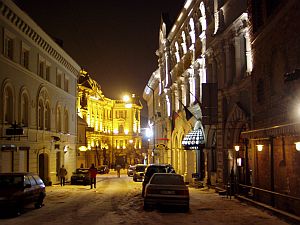
| ||
| Vilnius at night |
It was already getting dark at around 4 pm. Bad timing, but in winter all museums seem to close at 4 pm, too. The weather was still bad, and so we went back to the hostel - after almost 24 hrs on the train and an extensive walk through the town we needed some rest. In the evening we tried the small restaurant, although rather looking like a pub, next door. The waitress was very friendlu, too, but I can't speak any Lithuanian and she couldn't speak English, so we had to communicate in some sort of Russian. Lithuanian's staple diet turned out to be - potatoes. But the few traditional, home made dishes we tried were quite tasty. At night, many travelers met in the basement of the hotel - mainly Japanese, some Frenchmen, Canadians and of course check-it-out-man. Backpacker's microcosm so to say.
Relevant Links: →Lithuania | →Vilnius
Day 3: Vilnius → Trakai → Vilnius
As far as we had heard, Trakai near Vilnius seemed to be a pleasant destination. Among others, the small town is known for its minority - the Karaimų (aka Karaite). It's always interesting to see how minorities form an island within a sea of conformity, and so we opted for a trip to the green vicinity of the capital. I should better say white, because there was more snow falling at night, so everything was snow-covered. By bus it took us 30 minutes only to get to Trakai west of Vilnius. The bus station was quite far away from the centre, and so we started walking. The further we walked, the more rural it got. After two kilometres or so, we arrived in the 'centre' with beautiful blue, yellow, red and partially crumbling old wooden houses. Apart from us, there was no one else in the street.
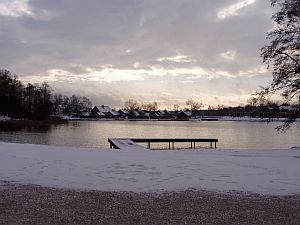
| ||
| Yes, it can be nice in winter, too... |
After all we weren't sure what was better - the historic centre of the village or the castle. Or maybe the quiet... We spent a couple of hours before we were heading back to the capital. This time, we caught a local bus, which took much more time. And so it was already almost dark again when we arrived in Vilnius. In the evening we went out again to find a nice restaurant for dinner. Heavy snow fall started again. Somewhere on a small, dark lane we discovered a neat bar and restaurant, which seemed to be very popular with local artists. The chef was some sort of artist, too - the food was innovative (other people would call it unusual) but excellent. The atmosphere was great, too - a nice place to propose to my beloved fellow traveler, I thought. And that's the way it went (for the record: we married five months later).
Relevant Links: →Lithuania | →Vilnius | →Trakai
Day 4: Vilnius → Riga
Since we'd added Belarus to our menu - a presumptuous plan when considering the fact that we only had two weeks - we moved northwards. Unfortunately, rail services to Latvia were suspended a couple of years ago, and so we had to stick to the bus. Actually, it was the one and only activity the weather allowed. The snow kept on falling, so that even the busy state road to Latvia was partially covered with snow. After half an hour or so, we'd left the suburbs of Vilnius and followed the road cutting a wide plain. The passenger in front of us was American, the guy next to him an Englishman. Naturally, the Englishman was reading a book written in English. It didn't take long until the American noticed the book, asking clearly and slowly "Where have you learned English!?" And so he scored an own goal... Halfway, shortly before arriving at the border crossing, the bus stopped at a roadside restaurant with a certain rustic charme but modern service. Inside, we enjoyed some excellent Lithuanian folk music while sipping a coffee. Unfortunately, staff couldn't tell me the name of the band. Crossing the Lithuanian-Latvian border nearby took a few minutes only. From there, it wasn't far to the next capital, Riga.
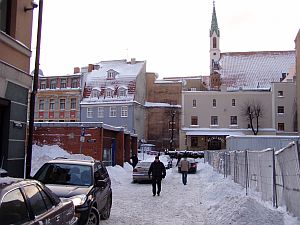
| ||
| Snow desaster in Riga |
The night before, half a meter or so of snow had fallen. The people were desperately looking for their cars, and we had some problems to orientate, too - in some places, the snow was piled up forming three to four metres high white barriers blocking the view of some buildings. Somewhere we found a sort of canteen, where we could warm ourselves while having some bread and pastries for a handful of centimes. The view from the church over the old town was splendid. Riga is completely different from Vilnius, but it's an amazing place, too.
Finding a nice restaurant and/or bar in the centre of Riga was a piece of cake - there are plenty of them. And almost everywhere, menus and staff are trilingual: Latvian, Russian and English. We finished the day with a Russian vodka 'Standart' (one of the top three vodkas worldwide, at least in my opinion, the others are 'Flagman' (Russia) and a Mongolian brand). Despite the weather it was a fantastic day.
Relevant Links: →Lithuania | →Vilnius | →Latvia | →Riga |
Day 5: Riga
We planned to dedicate the whole day to the interesting capital of Latvia. The old town is relatively large and has countless nice lanes, so there's plenty to see. The weather was really nasty then - within a few hours only it got much warmer, and so it was foggy, drizzling and the temperature was around 0 degrees Celsius. The snow in the streets started melting, turning the whole town into a dirty and muddy something. Nevertheless we headed for the interesting TV tower, which struck me as highly interesting the day before when we arrived.
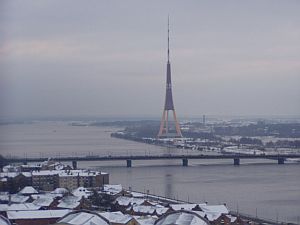
| ||
| The unusual TV tower of Riga |
Already before we arrived, I'd heard about a pelmeni (traditional Russian meat dumplings) restaurant in Riga. A restaurant - full of my beloved pelmeni! It turned out to be some sort of fast food restaurant specialising in pelmeni, but it was still okay. We didn't really want to go out in the ice-cold drizzle again, but there was so much left to see. -20 degrees Celsius are just fine, but this was much worse. Occasionally, we needed to go to a museum or a café to warm up a little bit. Around nightfall, the drizzle developed into heavy rain and all the streets and pavements became really dangerous then. Nevertheless we walked, or better slid about helplessly, to a big hotel to take the glass lift to a café on the top floor. From where we couldn't see anything - not even the streets below us. So much about traveling off-season.
Day 6: Riga → Tallinn
Tired of the weather, we moved further to the north, hoping for better conditions. The dead-straight road passed large forests for hours. Here and there we could see the Baltic Sea coast shimmering through the trees. Did I mention that it was still ice-cold, drizzling and foggy? The trip to Tallinn by bus was about to take around 5 hours, so we were sure that we would stop for a break. It proved to be wrong. After more than three hours we arrived at the border crossing. Since all the three Baltic states are members of the EU, there were no emigration controls.
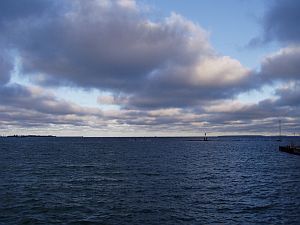
| ||
| A View over the Baltic Sea direction Helsinki |
It was already dark again when we entered the suburbs of the Estonian capital, Tallinn. As far as we knew, the bus station is a bit away from the centre, but suddenly the bus stopped at a busy crossroad, and the driver shouted 'Centre!' And so we got off the bus. It didn't take long to find out where exactly we were. The nearest hostel was called Old Town Hostel, but they didn't have any double rooms. Only two hundred metres away we found another one - also a hostel, but with very old and exquisite interior. Especially the kitchen was impressing and was just good enough for a museum. Tallinn is very expensive. We'd found out soon about that. Maybe this is due to the countless and comparatively wealthy visitors from Finland? Who knows. The hotel set us back € 40 per night, which was more then we'd expected. At night, we went out for a first walk through the city and ended up in "Tallinn's First Pub", which seemed to be the cheapest place around. Still, it was hard to get used to Estonian prices after being in Latvia and Lithuania.
Day 7: Tallinn
We hadn't had much time to explore the town the day before, and so we decided to stay for a whole day to enjoy the old town. But first we went to the bus station to get some tickets for the next day. After that, we walked to the port and then to the old town. It finally had stopped raining, and sometimes even the sun came out. However, it was far below 0 and a strong wind was blowing from the north. Among many other things, we came across a monument dedicated to the victims of the 'Estonia' (the ferry sank in 1994, leaving around 850 passengers dead). The monument itself was indeed impressive and couldn't have be done better. The historic town centre of Tallinn with its massive watchtowers and thick city walls was just great. It's probably the most photogenic of the three Baltic states' capitals. Unfortunately, I forgot our Japanese guidebook in a café, but we remembered the place and so I could get it back in the evening. It wasn't easy without a map, but after a while we could get by fairly well without. Halfway we had a look at some souvenir shops, but prices there were just ridiculous - a moose pullover for € 100 was about middle of the range. We zigzagged through the town until we got the feeling that we'd seen enough. Which was probably not correct, but we've seen a lot.
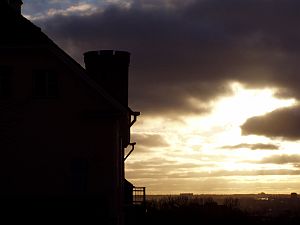
| ||
| In the old town of Tallinn |
In the evening we ended up in the same pub again, because the food as well as the atmosphere were quiet good. Some Estonians sitting at the table next to ours started chatting with us, and so it became an interesting evening. They were wondering why we visited Estonia during that time of the year - November can be called the worst time of the year, they agreed. They were right. We would have loved to stay longer, especially to visit the Estonian islands, but it didn't make much sense then. And so this was already our last night in Estonia. After getting back to our hotel, a police squad suddenly raided the latter. We had no clue why, but one of the policemen asking for my passport was very friendly and started a small conversation. After the short visit, I asked the young man at the reception if this would happen on a daily basis. He just smiled. Later on, I talked to him for quite a long time, and thanks to him I could finally find out about the pronunciation of all the 'ää' and 'õõ' often seen in Estonian words. Actually it's quite logical...
Day 8: Tallinn → Riga → Minsk
Is it possible to miss the bus when it leaves at noon? Well, we almost could have answered the question with 'Yes'. But we were on holiday and not on the run, although we sometimes got that feeling. After preparing our luggage, we went to the bus station again. many years ago, there was a direct train from Tallinn to Minsk, but unfortunately the route is not operated any longer. There's a direct train from Riga to Minsk. Our visa was valid from the 29th, but the train would cross the border on the 28th at 23:40, so we better did not risk trouble at the border. The train only runs once in two days, and so we had to stick to the bus again. First we returned to Riga. By the time we arrived, it was extremely cold again. In Riga, we had three hours of time to kill before the night bus to Minsk would depart.
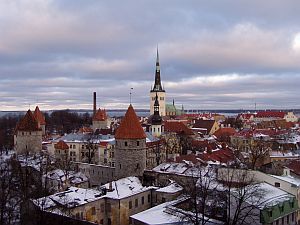
| ||
| The marvellous skyline of Tallinn |
Actually I do not really like buses, but thanks to the fact that there were very few passengers, we could grab the two front seats on the upper deck. The seats were quite convenient, too (however, it can't be better than on Taiwanese long-distance buses). The bus started on time. Two hours later we stopped at a snowy roadside restaurant. It was a good chance to get rid of the remaining Latvian money. However, I almost got on the wrong bus - bound for St Petersburg! Imagine my face at the Russian border. At around 1 am we arrived in the larger city of Daugavpils, which looked much drabbier than Riga. After another 15 minutes following very small roads completely covered with snow we reached the border crossing - in the middle of nowhere. Again, emigration was no problem at all. On the Belarus side, everyone had to get off, taking with all the luggage. We were the one and only foreigners on the bus, but they simply stamped our visa and that was it. The counter for the mandatory health insurance was closed, and so was the customs - they seemed to be sleeping. Well, it was already 2 am. And so we entered the Belarus completely hassle-free, which was quite surprising.
Relevant Links: →Estonia | →Tallinn | →Latvia | →Riga | →Belarus | →Minsk
Day 9: Minsk
Although the bus was convenient, I couldn't really sleep. Instead of that, I kept myself busy envying my fiancee, who was of course sound asleep. But so I didn't miss the vast and brightly lit suburbs of Minsk. It was absolutely impossible where the suburbs end and the centre of town starts - it was all the same. Shortly before seven in the morning, we finally arrived at the bus station. And immediately went to the adjacent train station occupying a very modern building. ATM's? Not existent. So we had to queue up at the bank to exchange cash. We almost left the bank as millionaires - one Euro was worth 2,900 Roubles. It's going to take some time to get used to this currency was my first thought. Many dead drunk people were staggering across the glass, marble and steel building. At a kiosk inside the station I dared to try ordering a cup of coffee. The answer was clear: "Not now! Go away!" Welcome to Eastern Europe (ok, it's not always and everywhere like this). At least I managed to get a city map for a handful of Roubles. It seemed to be the rush-hour when we entered the subway station to get to the outskirts. According to a usually reliable source in the internet, there ought to be a rather inexpensive but good hotel with rooms for around 5 to 10 USD.
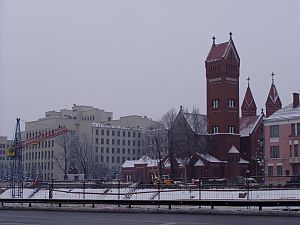
| ||
| It took some time to discover an old building: Church in Minsk |
At least she told us how to get to the subway station by bus. Getting tickets for the bus was a challenge, too. The ticket kiosk was closed. We moved on to the next kiosk, where I said 'Biljet!' That's the Russian word for ticket, and virtually every one in Eastern Europe, Russian or not, understands the word. Not the young lady in the kiosk. I flashed bus tickets from another town, saying 'Biljet! Ticket! Bus!!!!!' No way. After a while she seemed to understand, sending us to the (closed!) ticket kiosk. An old man behind me touched my shoulder and said "Don't worry, it's okay" before he pushed us into the next bus. Later on we got our tickets at another kiosks. The ticket says 200 Roubles, but the real price (probably changing once in a week or so) was 320 Roubles.
We took the subway again to get to another, allegedly cheap place to stay. The dormitory of the Academy of Science shouldn't be that expensive. But - 50 Dollars for foreigners. By then, we were completely exhausted and gave up. All we had to do to get the room was to fill out four forms - all of them asking the same questions and of course in Russian only. After that, we finally got our dark, old room.
To say that the weather and the town itself were some sort of compensation for all the effort would be an exaggeration. We took it easy and walked for hours and hours through the giant concrete jungle called Minsk. And we decided to stay in Minsk for one night only and move on to a smaller town instead. The receptionest of the dormitory was very grumpy at the beginning, but when we returned in the evening she seemed to have made her peace with us. She even phoned the hotel in the small town where we wanted to go. And she even refused when we wanted to pay the fee for the phone call.
The weather was still lousy in the evening, which is why we didn't want to go out again to look for a restaurant. Inside the dormitory, there was a tiny and somewhat strange smelling Chinese restaurant. The cooks, as I'd already noticed before, seemed to be Chinese. Naturally the warmly welcomed my Japanese companion. The food was ... well, corresponding with the environment. A wasted Russian was sprawling at the bar and kept on annoying the friendly waitress. My companion had already gone upstairs to take a shower. It would be only a question of time until the Russian would discover me. While thinking this, he already approached with two glasses of vodka in his hands. Za druzhbu! (One for the friendship!). Although completely drunk, he guessed right when he said "Nyemets?" (=German). He was really from Russia, but for some reason he was stuck in the Belarus. Soon he started to unburden himself to me, talking about life there and so on. And he asked for my name and my age at least five times. After a while, he asked for my room number. Pardon!? I told him that I wasn't alone and my wife(-to be) would wait upstairs. He didn't care about that - he wanted to come to my room to kill another bottle of vodka. Well, this could be fun, but he was really very drunk, so I didn't really believe in enjoying his company for hours. Before I could say "Stop!" he rushed to the bar trying to buy a bottle of vodka. All I could do now was run. A few seconds later I locked our room on the 4th floor... that was close.
Day 10: Minsk → Nyazvizh
It was time to get away from Minsk. Maybe it's fun to visit the town in summer, but on a cold and foggy day in November it can be really depressive. We went to the train station and bought tickets for the next train to the west, but we had two hours left until the train would leave. Therefore we went out again to explore the surroundings of the station. Coincidentally, we came across the main post office. We hadn't thought about writing post cards until that moment - thank God we found the post office. In Moldova, we got stamps but didn't see any post cards, and so far we hadn't seen any post cards in Belarus, too. The post office was surprisingly large and very modern. We asked for stamps to Japan and Germany, just to get told that the postage is always the same - no matter whether it's Poland or Fiji. And so we asked for 15 stamps. "5,400 Rouble" she said - that's less than € 2. Next, we asked for picture post catds, and they even had some - actually, they offered boxes with 15 cards inside, what a coincidence. I said that I would like to have one of those, too. She flashed the calculator again and finally said "That's 4,600 Roubles all together!" I gave her a puzzled look, but she'd already snatched the 5,000 Rouble bill out of my hand, handing back 400 R. She might have better stuck to the abacus...
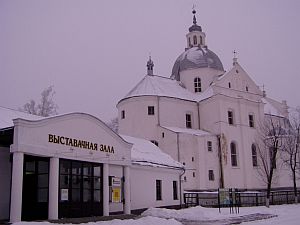
| ||
| Nice old church in Nyazvizh |
Once in Garadeya, we were first looking for the departure table for buses running to Nyazvizh. Suddenly, someone rushed into the waiting room, saying that he would need two more people to share a taxi. Why not. For less than € 1 we arrived in Nyazvizh in no time at all. As far as we knew, the hotel can be found on Belarus Street, but no one seemed to know the street. And so I changed the strategy, not asking for the street but for THE hotel. It's the only hotel and so they knew where to go. There, the double room 'only' costs € 25. The town had plenty to offer - a beautiful castle, which was under reconstruction, some old buildings and a beautiful old church. The clergyman gave as a heartly welcome and locked the door behind us - because of the thieves, he said. The first question he asked was 'Do you speak English?' I said yes, and then he seemed to be happy as a child. He didn't get tired of mentioning how bad his English was, but he was trying hard and we had no difficulties in understanding him. Since he had had an appointment, he suggested that we might meet in an hour. After meeting again, he showed us around, explaining everything not just inside the church but also in the crypt. It was quite fascinating and he was really trying hard to answer every question we had. After the private tour we made a small donation and bought some post cards. Actually, he was the first person we met in Belarus who could speak a foreign language (apart from the Chinese cooks of course).
In the evening we opted for the restaurant inside the hotel - appearantly the only restaurant in town. After a while, the restaurant transformed into a disco. The atmosphere was quite good and the food was okay. The waitress was somehow old-school, not allowing us to leave the place before we had tried one of the desserts. Due to the weather and the dull capital, my first impression of the country was not the best one. But I'd changed my mind after going to Nyazvizh. Yes, the Belarus can be a nice place.
Day 11: Nyazvizh → Brest
Soon after getting up, I went downstairs to the small café inside the lobby to get a cup of coffee. Unfortunately, staff of the cafe spontaneously decided to make a full inventory (of all three chocolate bars and seven packages of biscuit) for a whole day. And so the two ladies spent their time sitting behind the closed glass door chatting and giggling. But there was another place nearby, some sort of a bakery. Among the infamous butter-cream cakes I noticed some muffin-like pastries. There were looking much better than the rest, which is why I ordered one or two of them. The fat lady behind the counter put it straight: "They are old, I wouldn't recommend them". At least she'd warned us...
We went back to Garadeya by bus. Black clouds were almost touching the earth and it was foggy. The snow-covered fields became one with the winter sky. The bus was crowded and the air was sticky, so that the windows steamed up soon after the doors closed. In Garadeya, we bought a ticket to the closest bigger city, Baranovichi, hoping that we could catch a fast train from there to Brest. No chance. We were told that express trains would leave from another station in town, and it wasn't worth the effort. And so we spent another five hours on the elektrichka to Brest, passing a dark-white to light-grey winter landscape.
It was already dark when we arrived in Brest. Our first impression was pure chaos - hundreds of people were loitering in and around the train station. As soon as we had discovered the counter for international train tickets, several elder women approached. And asked, whether we would head for Poland. If yes when and where to. This was just to introduce their real intention: They wanted us to smuggle some cigarettes. We'd already had the same pleasure when we traveled from the Republic of Moldova to Romania, Yeah, smuggling cigarettes into Poland - I always wanted to do that! (Actually Poland is considered cigarette smuggler's paradise in Germany). However, we refused.
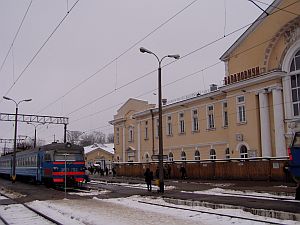
| ||
| The train station of Baranovichi and an elektrichka |
By then, it already started raining. Nevertheless we decided to try another place. In the next hotel, a double room set us back € 33 - at least with a transparent price policy. A large board behind the counter quoted room prices for Belarusians, CIS citizens and 'others'. We already knew the rules of this game, and so we decided to stay. Obviously, there was more staff then visitors - corridor guards, bedlinen changers, shower-room-openers etc. In the evening, we gave a try at the hotel restaurant downstairs. The menu was almost identical to the one of the restaurant in Nyazvizh. After a weird salad consisting of thick cream, beetroot, raisins, nuts and carrots, I thought that it would be a good idea to pour down the salad with something that might help the digestion - a vodka. "A local brand, if possible" I added. The waitress nodded and brought one a few minutes later. Now I was interested in the name of the vodka (it was a terrible firewater, so I wanted to make sure that I'd never order it again). The answer was a surprise: "Well, Vodka!" she beamed. Say what! I knew that I ordered a vodka...but after a while she understood and told me the proper name: Vodka CCCP (=U.S.S.R.). What else.
Day 12: Brest
We had a full day to explore Brest and the famous fortress. The holy quest for a simple cup of hot coffee in the morning was a fiasco: The hotel restaurant was indeed open, and according to the menu there was also coffee. However, both waiters successfully ignored my attempts to order a coffee. As a matter of fact, I already thought that I'd become invisible overnight. Well, I understood them - a plain coffee is not really lucrative but involves a lot of work - taking the order, make the coffee, serve the coffee, charge the customer, wash the cup - not to forget all the paperwork! Every item must be listed in a special book for orders. By hand, of course.
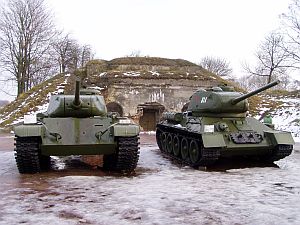
| ||
| Old Soviet tank inside the fortress |
After four hours or so walked back to the centre of town, which was, compared to Minsk at least, multifarious. When in Belarus, we should at least eat Pelmeni once, I thought. In every small café and restaurant, pelmeni was listed on the menu. But not available. In the third café we succeeded, and the staff was surprisingly friendly. There was even a computer with internet access, which was the first one I'd seen in Belarus. Unfortunately, it took already more than 15 minutes to open the start page of the railway company - as long as it took the staff to prepare the pelmeni. I wanted to check the time table to see how we could get out of Brest, but eventually I gave up.
Already before coming to Brest we'd heard about a real good Indian restaurant in town. We had the address and it didn't take long to find the modern building. Just to find out, that the place was taken over by the Chinese. What a pity. Having a nice Indian meal in Belarus was what I'd dreamt of. Instead of that, we went to a restaurant specialising in fish. Well, Belarus is quite far away from the sea, so we weren't sure what the place would be about. But it was a surprise - they even had an English and a German menu, unfortunately without the prices, and Russian beer on tap. The food could have been worse, and the service was excellent. All in all it was a nice place to burn the last Roubles we had.
Day 13: Brest → Warsaw → Berlin → Halle
Not even two weeks had passed, but we already had to go home. The weather was bad for most of the time, and Belarus was quite interesting on the one hand but somehow repulsive on the other hand (which was probably mostly due to the weather), and so we were looking forward to going home - a feeling we usually never have. We had a long way to go, which is why we had to start early in the morning. We got up at half past four. Since leaving Belarus involves long procedures at the border, we were told to show up at the station at least one hour before the departure of the train. Staff at the ticket counter had told us the day before, that the fare for the express train to Warsaw would be € 13 per person, and so we kept some € 30 in the Belarus currency.
We went to the counter first, and now they told us that one ticket would set us back € 24 per person. Which means that we would need € 48. Therefore we had to change money again. When we came back to the counter, another lady served us. Two tickets to Warsaw? That's 75,000 Rouble (around € 26) please! I was beginning to have doubts about my Russian skills and my ears. After getting the tickets we returned to the exchange booth, where staff rolled their eyes when they saw us again. We changed the money back to get some Polish Zloty and a few Euro.
Dozens of passengers were waiting for a closed door. The door to the Belarusian customs inspection. We were a little bit afraid of passing through that door, since we'd heard some rumours. Fortunately, we were in the first line. After a while, the door opened and six people were allowed to enter. We were among them. We put our luggage on one of many tables in a large room. There, we were left alone. Other passengers started to fill in a declaration form - of course in Russian only. No one told us to do so, but I filled in the forms to in order to avoid a longer delay. After some minutes, a grim-faced officer approached and asked how much cash I was carrying with me. My companion was the next. Same as me, she handed the declaration form. He took the paper, crumbled it up into a ball and threw it on the floor right in front of her feet. That was it. My companion finally had enough of this place. It's not just that suspiciously looking people took pictures of us in Minsk several times (and I don't think that the average Belarusian is running around with a camera at hand). Also, people often blankly stared at us. And now this son of a ...
Next was passport control, which was time-consuming as well. Right behind the passport control, our train already waited. Three minutes before departure we finally passed everything and jumped on the train. That was close. All carriages of the train were sleepers. The Polish conductor spoke excellent German and explained, that we would have to pay a fee of € 11 each, because it's a sleeper. So this was the explanation for the different train fares we were told before! We shared our compartment with a Russian man. He was traveling from Moscow to Terespol beyond the border, which takes more than 20 hours. He had no luggage at all - not even a handbag or something. This seemed quite unusual to Polish customs inspection, too.
Now that we were forced to pay the 11 Euro for the sleeper, we decided to make use of it and make up for some sleep. We had around 4 hours time to Warsaw to do so. After half an hour in Warsaw, we took the Warszawa-Berlin-Express again so that we arrived in Berlin six hours later. From there, it was a 2 hours ride only to get home.
Slightly more than one week is definitely not enough for the Baltic States. But it's also clear that November is definitely the worst season to travel around there. Belarus was interesting but only for the interested traveler with low expectations. However, people looking for a certain charme and partially irrational and absurd adventures should give it a try - it's another European face. Nevertheless, to me, Belarus seemed to be the country which is the place most faraway from Europe. And I'm not talking about the physical distance.
©2024 Europe-East.com

 Albania
Albania Travelogue Index
Travelogue Index